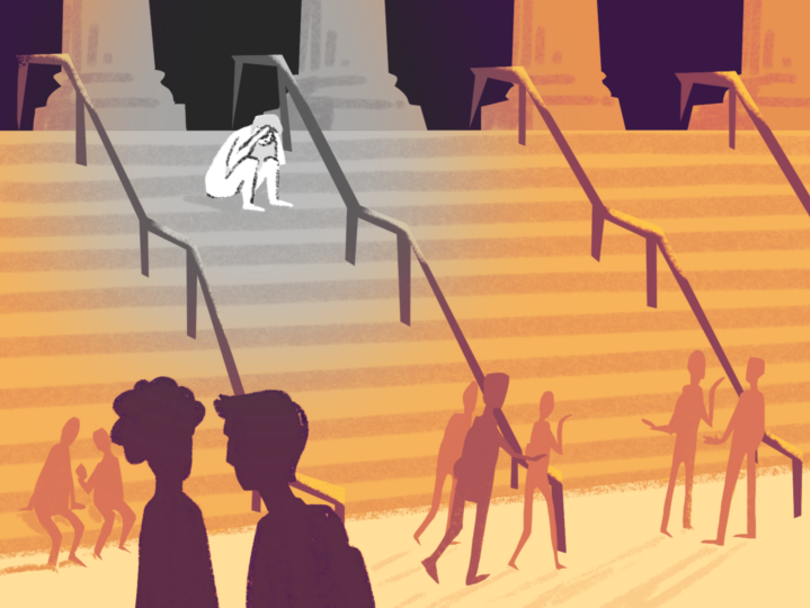Personal Essay: Finding comfort in solitude deepens connections with others

Our columnist says a more mindful approach and leaning into solitude can elevate your connections with others. Seeing yourself as a friend increases your valuation of the mundane. Flynn Ledoux | Illustration Editor
Get the latest Syracuse news delivered right to your inbox.
Subscribe to our newsletter here.
In 2023, former United States Surgeon General Dr. Vivek Murthy declared the country was facing a loneliness epidemic. Murthy said loneliness is an experience that results from “perceived isolation or inadequate meaningful connections.” At the time, this made sense, as our world was three years out from the beginning of the COVID-19 pandemic.
Loneliness doesn’t discriminate. Meaningful, healthy social connections depend on the frequency of our social interactions with others, the function each relationship serves and the satisfaction we derive from them. Each significantly contributes to our perceived sense of belonging.
Entering college, the importance of shared interests or values lessens in the process of making friends. Rather, everyone is ravenous for social connection, and campus feels like the perfect place to find it.
But as time goes on, the noise and chaos of new experiences begin to die down. In the quiet, you might realize it’s been a month since you’ve gotten a hug. Or your new friend group doesn’t know the “old” you at all. While this might have felt like a positive move toward brand-new relationships at the beginning of college, it can suddenly feel depressing.
What many fail to realize is this sense of isolation is normal. Whether we recognize it or not, every person needs a transition period from one stage of life to the next. College is no exception.
Still, this phase can hit us hard. One moment you’re skipping gleefully down Comstock Avenue after a night out with your new best friend in the whole world. Next, you’re sitting on your dorm floor in your PJs, hoping someone from home will pick up your FaceTime call and reassure you you’re a good person.
For many of us, these are our first real experiences of being uncomfortably alone with no remedy readily available. Going back to how things used to be is no longer an option because it no longer exists.
In the practice of embracing solitude, I find we get closer to how humans should behave toward themselves and each other.Maya Aguirre, Columnist
Luckily, though, humans are equipped for change. A mid-20th century experiment conducted by an Austrian professor demonstrated our ability to adapt. The professor gave a man glasses that turned his eyesight upside-down. At first, the man couldn’t function normally. But within a week, he had adjusted to his altered vision. By day 10, he could ride a bicycle with the glasses on.
Having your vision flipped upside down is uncomfortable and disorienting, but learning how to live through it builds resiliency that undoubtedly serves your future.
I don’t suggest we build complacency in our loneliness. Rather, we must build comfort in solitude.
Murthy described solitude as “a state of aloneness by choice that does not involve feeling lonely.” College offers us an opportunity to increase our capacity for self-understanding and growth in newfound periods of time on our own. We do ourselves a favor by presently sitting in the discomfort of being alone rather than fighting against it.
The paradoxical experience of loneliness is often a result of ineffective, passive alone time. Many of us tend to decompress by going on social media. But diluting our alone time with scrolling or mistakenly considering social media as genuine social interaction runs the risk of greater loneliness.
At one point amid my sophomore year, I called my mom in a state of distress about my lack of friends. Seeking comfort from her, I felt frustrated when she simply advised me to “be my own best friend.”
But as months passed, this advice proved itself to be actionable. By considering myself a friend, I began to see time with my own thoughts and emotions as enjoyable.
I enjoyed the effect “best friend” status had on the way I treated myself. I took myself on walks, went with myself to do laundry and treated myself to dinner. I didn’t always remind myself of embarrassing things I’d said or done because I’d never treat my best friend like that.
Being our own best friend doesn’t limit us to only spending time with ourselves, though. Nowadays, I’m more creative with how I find social fulfillment. In the practice of embracing solitude, I find we get closer to how humans should behave toward themselves and each other.
I started to smile more at strangers. My screen time decreased. I had the capacity to remember details about my friends and professors I had never paid attention to before. My worldview developed, and I wasted less time being anyone but myself.
Making small talk with my classmates or sharing a moment with a stranger on Marshall Street to appreciate the clouds satisfies one aspect of my social needs.
The closest friends I’ve made at Syracuse University prove the importance of consistency and patience in building deep and lasting connections — skills only made possible by my trials alone.
Finding this equilibrium certainly isn’t instantaneous, and it can be very uncomfortable. It’s hard to have your vision flipped upside down. But through the uncomfortable transition, we can learn to embrace ourselves as our own best friends and strongest allies.
Maya Aguirre is a junior digital journalism and history major. Her column appears bi-weekly. She can be reached at msaguirr@syr.edu.






